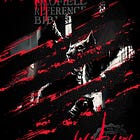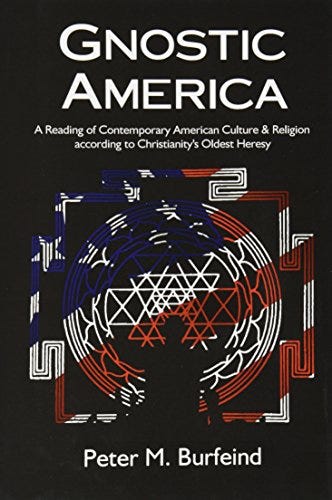Teacheth Us to War: A Biblical Primer on Spiritual Warfare, Part I
Arm thineself Christian soldier...
“Blessed be the LORD my strength, which teacheth my hands to war, and my fingers to fight:”
― Psalm 144:1 KJV
Related Entries
It is hard not to look at the state of modern Christendom, particularly evangelicalism, and see the Gnostic and occultic influences that have wormed their way once again into a prominent position within the Church.
Throughout the ages, insidious doctrines and diabolical teachers have ensnared the minds of the desperate and the simple; the carnal and the craven. The Valentinian Gnostics of the 2nd century were among them, drawing upon their mystical, extra-biblical revelations to interpret Scripture (emphasis mine):
Such, then, is their system, which neither the prophets announced, nor the Lord taught, nor the apostles delivered, but of which they boast that beyond all others they have a perfect knowledge. They gather their views from other sources than the Scriptures; and, to use a common proverb, they strive to weave ropes of sand, while they endeavour to adapt with an air of probability to their own peculiar assertions the parables of the Lord, the sayings of the prophets, and the words of the apostles, in order that their scheme may not seem altogether without support. In doing so, however, they disregard the order and the connection of the Scriptures, and so far as in them lies, dismember and destroy the truth. By transferring passages, and dressing them up anew, and making one thing out of another, they succeed in deluding many through their wicked art in adapting the oracles of the Lord to their opinions. …
In like manner do these persons patch together old wives' fables, and then endeavour, by violently drawing away from their proper connection, words, expressions, and parables whenever found, to adapt the oracles of God to their baseless fictions.
— Irenaeus of Lyon, Against Heresies, Book I Chapter 8.1
Valentinus’ spiritual descendants are certainly among us today, as millennia of sound doctrine, particularly in regards to the vitally important topic of spiritual warfare, are being exchanged for their “fresh”, extra-biblical and anti-biblical revelations.
— The Army Appears in the Heavens (II Maccabees 3:2), ill. by Gustave Doré.
Scripture tells us that this should be no marvel to see this occurring once again in our day and age:
The thing that hath been, it is that which shall be; and that which is done is that which shall be done: and there is no new thing under the sun.
— Ecclesiastes 1:9 KJV
And so, one of the oldest heresies has reared her ugly head yet again, suffusing the realm of spiritual warfare in poisonous teachings that place the sheep in an even greater bondage:
Thus the perfect storm: globalization and the yearning for transcendence, the sacralization of the Self bred by democracy, the abstracting of humanity worked by technology, the cynicism toward traditional institutions fostered by the breakdown of the family, and the novelty of a seemingly more authentic expression of Christianity. These forces synthesize with movements in culture, politics, and religion, and a Gnostic reading of contemporary society illuminates the movements of our times. In religion, the popularity of New Age spiritualities, but more interestingly the trajectory Neo-evangelicalism has taken, falls under this banner.
— Peter M. Burfeind, Gnostic America
There are many teachings being promulgated within Christendom that fall into this camp: their origins are occultic or Gnostic in origin, and their operations can not be found in Scripture whatsoever.
Whether we realize it or not, every day we are engaged in warfare: not a carnal one of flesh and blood, but against principalities, powers and ideas; against the insidious rulers of darkness and the malefic forces of spiritual wickedness that ever seek to ensnare the souls of mankind. It is in this arena of souls that our faith is purified in the refiner’s fire, our resolve sharpened, and our allegiance to the Almighty fortified. In the tumultuous battlefield of the spiritual realm, the Christian is called not merely to stand as a passive observer — we are to be a tireless soldier of the Kingdom, clad in the armor of God and engaged in that eon’s long battle between Light and Dark.
“He that trusteth in his own heart is a fool: but whoso walketh wisely, he shall be delivered.”
— The Book of Proverbs 28:26 KJV
Now more than ever, a plethora of competing doctrines, theories, and assertions are brought forward with which we are told to battle the forces of Darkness. How then are we as Christians to war against these unseen foes? How are we to discern that which is true and that which is false; that which is of Christ and that which is opposed? Firstly, we must eschew our fleshly wisdom and earthly understanding:
Trust in the Lord with all thine heart; and lean not unto thine own understanding.
In all thy ways acknowledge him, and he shall direct thy paths.
— The Book of Proverbs 3:5-6 KJV
We must acknowledge that our wisdom is fallible and our understanding in this carnal realm is limited: we must lean on the eternal wisdom of God. Scripture is replete with warnings against trusting our emotions and our feelings:
The heart is deceitful above all things, and desperately wicked: who can know it?
— The Book of Jeremiah 17:9 KJV
The heart of man is treacherous, and if we rely on it, on our ephemeral and fleeting feelings, we will quickly pave the pathway to our own demise. As Christians we must reject the ways of the Polis:
And be not conformed to this world: but be ye transformed by the renewing of your mind, that ye may prove what is that good, and acceptable, and perfect, will of God.
— Epistle to the Romans 12:2 KJV
It is only by this renewal, by our rejection of worldly wisdom and man-centered ideologies, that we can seek to do the perfect will of God.
Thusly, discernment is something that all believers are called to practice (emphasis mine):
1 Beloved, believe not every spirit, but try the spirits whether they are of God: because many false prophets are gone out into the world.
2 Hereby know ye the Spirit of God: Every spirit that confesseth that Jesus Christ is come in the flesh is of God:
3 And every spirit that confesseth not that Jesus Christ is come in the flesh is not of God: and this is that spirit of antichrist, whereof ye have heard that it should come; and even now already is it in the world.
— 1st Epistle of John 4:1-3 KJV
We are adjured by our LORD to be wise as serpents, to test the spirits, to exercise prudence and not simply to believe every claim put before us. It is not pharisaical to hold up teachings and traditions against the Word of God: it was in fact the Pharisees who placed their traditions over the Word, thereby nullifying it in place of their man-made doctrines (Mark 7:13).
The Bereans are called noble for doing this very thing:
10 And the brethren immediately sent away Paul and Silas by night unto Berea: who coming thither went into the synagogue of the Jews.
11 These were more noble than those in Thessalonica, in that they received the word with all readiness of mind, and searched the scriptures daily, whether those things were so.
— Acts of the Apostles 17:10-11 KJV
Not even the Apostle Paul, the great theologian of the New Covenant, is above this standard — how much more so the teachers and preachers of today! The sufficiency of Scripture is critical to this understanding: the Bereans searched the Tanakh in order to prove all things, to test the spirits, and they are forever commended in the pages of God’s Word for it.
The Apostle Paul makes this abundantly clear to Timothy:
16 All scripture is given by inspiration of God, and is profitable for doctrine, for reproof, for correction, for instruction in righteousness:
17 That the man of God may be perfect, thoroughly furnished unto all good works.
— 2nd Epistle to Timothy 3:16-17 KJV
That Greek word for perfect, artios, denotes completeness. Scripture is not only profitable for the teaching of the brethren and rebuking of the pagan, it is sufficient and necessary for the perfection of the man of God to do *every* good work. Quite simply, any good work we are to do as a Christian can and must be derived from Scripture.
Scripture consistently teaches that we should not rely on our own understanding, feelings, or experiences alone; but rather, on the Word and wisdom of God. Personal experiences and feelings can be subjective and deceptive, whereas Holy Scripture provides the only sturdy foundation for truth, guidance, and righteousness. Therefore, every experience or belief concerning the Christian faith must be scrutinized and validated in accordance with the teachings of Scripture.
“3 For though we walk in the flesh, we do not war after the flesh:
4 (For the weapons of our warfare are not carnal, but mighty through God to the pulling down of strong holds;)”
— 2nd Epistle to the Corinthians 10:3-4 KJV
Like all good soldiers, we must first be trained and equipped in order to succeed in these battles. Let us turn to the oft-quoted Ephesians 6:
10 Finally, my brethren, be strong in the Lord, and in the power of his might.
11 Put on the whole armour of God, that ye may be able to stand against the wiles of the devil.
12 For we wrestle not against flesh and blood, but against principalities, against powers, against the rulers of the darkness of this world, against spiritual wickedness in high places.
13 Wherefore take unto you the whole armour of God, that ye may be able to withstand in the evil day, and having done all, to stand.
It is only through arming ourselves with the spiritual implements of the faith, the armor and Word of God, that we can withstand the forces of darkness.
Let us now inspect the armory of the faith for ourselves:
The Belt of Truth
14a Stand therefore, having your loins girt about with truth,
As the belt cinches the soldier’s attire, ensuring readiness and agility, so too does truth fortify the believer’s integrity and purpose. Truth is the foundation upon which all other virtues rest, anchoring the soul against the insidious wiles of the deceiver. Without truth, the entire ensemble of spiritual armor would collapse, for deception is the enemy’s primary stratagem.
The Breastplate of Righteousness
14b and having on the breastplate of righteousness;
The breastplate guards the vital organs, much like righteousness shields the heart from the corrupting influence of sin (Isaiah 59:17 uses this same analogy to describe the armor of the Messiah). Just as a soldier’s breastplate protects against lethal blows, righteousness deflects the fatal arrows of moral compromise. That Greek word for righteousness, dikaiosuné, also means justice, which the Prophet Micah rebukes Israel for failing to execute:
He hath shewed thee, O man, what is good; and what doth the Lord require of thee, but to do justly, and to love mercy, and to walk humbly with thy God?
— The Book of Micah 6:8 KJV
Justice is the very essence of the LORD's character, bestowed upon us through faith in Christ and imbuing us with the strength to stand resolute against the moral relativism that seeks to erode us. That which is righteous is just, and that which is true is righteous.
The Sabatons of the Gospel
15 And your feet shod with the preparation of the gospel of peace;
The soldier’s footwear ensures stability and readiness in the thick of battle. Likewise, the Gospel equips the believer to traverse the treacherous terrain of a fallen world:
How beautiful upon the mountains are the feet of him that bringeth good tidings, that publisheth peace; that bringeth good tidings of good, that publisheth salvation; that saith unto Zion, Thy God reigneth!
— The Book of Isaiah 52:7 KJV
The Gospel of peace is not a call for us to engage in a pacifistic retreat: it is a thundering battle-cry to advance the Kingdom of God with unwavering conviction. It alone provides the traction needed to navigate the shifting sands of cultural upheaval and moral ambiguity.
The Shield of Faith
16 Above all, taking the shield of faith, wherewith ye shall be able to quench all the fiery darts of the wicked.
As our shield, faith is the bulwark against the relentless onslaught of doubt and despair. In ancient warfare, the shield was not only a means of defense, but also a formidable tool for advancing against the enemy when in the unity of a phalanx. Faith extinguishes the fiery darts of the wicked— those insidious thoughts of fear, temptation, and accusation — rendering them powerless. It is through faith that we appropriate the promises of God, transforming them into a shield of divine protection and empowerment:
But without faith it is impossible to please him: for he that cometh to God must believe that he is, and that he is a rewarder of them that diligently seek him.
— Epistle to the Hebrews 11:6 KJV
Faith is our active trust in the reality, sovereignty, and goodness of God, enabling us to repel every assault of the adversary with unshakable confidence.
The Helmet of Salvation
17a And take the helmet of salvation, and the sword of the Spirit, which is the word of God:
The helmet protects the head, the seat of the mind and intellect, symbolizing salvation through the assurance of deliverance from death and damnation. The helmet of salvation signifies too the renewing of our minds, aligning our thoughts with the eternal perspective of God’s redemptive plan. It is this assurance of our place in Christ’s current and eternal Kingdom that empowers us to think and act with preternatural courage, resisting the deceptions that seek to undermine our faith.
The Sword of The Spirit
17b and the sword of the Spirit, which is the word of God:
The sword is both offensive and defensive, represented by the Word of God — the ultimate weapon against the forces of darkness. It is through the incisive power of Scripture that we discern truth from falsehood and light from darkness. The Word of God “is quick, and powerful, and sharper than any twoedged sword” (Hebrews 4:12). In wielding the sword of the Spirit, we engage in spiritual combat with the authority and precision of God’s revelation, dismantling strongholds and advancing the Kingdom of God with relentless fervor.
The Prayers of the Saints
18 Praying always with all prayer and supplication in the Spirit, and watching thereunto with all perseverance and supplication for all saints;
Our fervent prayers rise like incense before the LORD (Psalm 141:2), ascending to the Throne of Grace, as we humbly beseech the LORD of Hosts for guidance, strength, and victory in the spiritual battles that rage around us. In this sacred calling, we do not wage war haphazardly or with earthly weapons, but with the unwavering conviction that our weapons are mighty through God for the pulling down of strongholds, demolishing arguments and every pretension that sets itself up against the knowledge of God (II Corinthians 10:4-5).
— Teacheth Us to War, digital art, 2024.
As the Western world crumbles around us, as the darkness of godlessness encroaches and the shadows of paganism lengthen, we stand amidst a conflict as ancient as the cosmos itself. The insidious whispers of Gnosticism, masked under the guise of modernity and self-enlightenment, have infiltrated sanctuaries where once the Word of God held sway alone. These heresies are both ancient and serpentine, weaving their tendrils through the fabric of our faith, seeking to distort and devour the unwary and undiscerning. In the face of this assault, we are reminded that our battle is not of flesh and blood, but against principalities; against powers; against the rulers of the darkness of this world.
In this sacred struggle, we are more than conquerors through Him that loved us, and it is through His eternal truths that we shall triumph (Romans 8:37). We may stand firm — not in our own strength, but in the power of His might. As the Psalmist declared, “Blessed be the LORD my strength, which teacheth my hands to war, and my fingers to fight”. With this divine assurance, we may stride boldly into the fray, ever vigilant, ever resolute, ever anchored in the unshakable Word of God.
Let us then, as valiant warriors of the faith, press onward with unwavering resolve, ever discerning, ever steadfast, until the final victory is wrought and the Kingdom of God reigns supreme.
Continued in Part II…
“Be sober, be vigilant; because your adversary the devil, as a roaring lion, walketh about, seeking whom he may devour:”
— 1st Epistle of Peter 5:8 KJV














A much needed topic. Preach it brother!
Awesome Scipio!